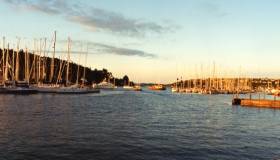Displaying items by tag: Cool Route Project
CIT's Cool Route Project Invites Alumni To Try Sailing
#CoolRoute - Cork Institute of Technology (CIT) is inviting alumni and friends – especially those with no previous experience – to 'Try Sailing' at a yacht club near you.
The drive comes from a partnership between CIT, the Royal Cork Yacht Club and the Irish Sailing Association and falls under the remit of CIT's Cool Route Project, which aims to attract business to peripheral locations by promoting yacht cruising on the scenic coastline of North West Europe.
Capitalising on the current big push to attract young people to sailing and cruising, 'Try Sailing' developed as a result of discussions with with ISA and RCYC via the CIT Cool Route team.
Individuals and groups alike are encouraged to head to Crosshaven – one of many other participating clubs around the coastline – to take out a 1720 class racer with an instructor for three hours, all necessary safety gear provided and no previous experience necessary.
While there is a small fee involved, there are possible group discounts for CIT alumni and friends.
For more details visit the Try Sailing website, follow the hashtag #eucoolroute on social media or visit Facebook.com/eucoolroute
Cruisers Called For Survey On 'Cool Route' Project
#Cruising - The Royal Cork Yacht Club is among those partnering a new project to develop and market cruising grounds across Europe's North Western Seaboard from Ireland to Norway.
The Cool Route Project, funded by the Interreg VB Northern Periphery and Arctic Programme, has the involvement of all national sailing organisations in Ireland and the UK, as well as strategic partnerships in Norway and the Faroe Islands.
Wide-ranging research is now being conducted on a transnational collaborative basis by Cool Route on the cruising preferences of sailors along the North Western Seaboard.
"This research, which is incorporating the expert views and priorities of cruising skippers, will be an important input to the future development and marketing of cruising in these waters," say the project organisers, who invite relevant sailors to complete an online survey HERE.
























































